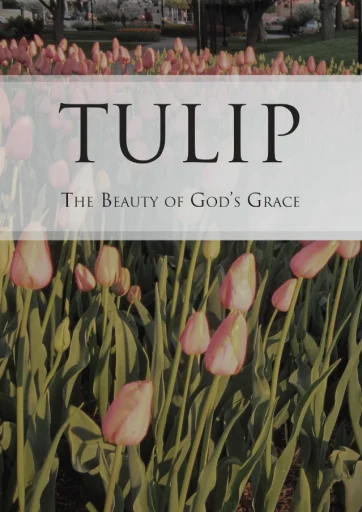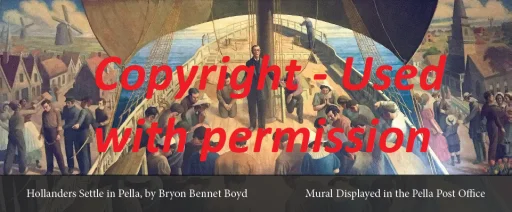The story of Pella’s founder, Hendrik Peter Scholte, is a story of courage in the face of religious tyranny; and ultimately, the importance of separation of church and state, a law which was enacted to protect the church from the state.
Scholte was a prominent church leader in Holland in the early to mid 1800s during a movement called the Secession of 1834. The Reformed Church in Holland was suffering, and many struggled to pay their pastors. In 1816, Prince William became King William I. One of the first issues he dealt with was the relationship between the church and state. He reestablished the Reformed Church as the state church. State aid for the church brought some positive changes, such as funding salaries, but it came with strings attached.
The King appointed a commission which, among other things, created a new church order and signed it into law. This church order abolished the presbyterian form of church government and destroyed the local autonomy of the congregation. The King set aside one of the creeds, the Canons of Dort, which had been formed at the church council in Dordrecht in 1618-19. It also upheld the use of a state commissioned hymnal which conflicted with these historic Reformed doctrines. While many welcomed the changes, others sent letters of protest.
Hendrik Peter Scholte was one of those who fought from within to restore key biblical doctrines to the church. This group of non-conformists became known as De Afscheiding (The Separation or Seceders). Many of the Seceders “endured the invasion of soldiers quartered in their homes and were forced to pay hefty fines… if they were unable to pay, their possessions were sold in Sheriff’s sales” (p. 133)
How it began
One key event that rapidly propelled the Secession forward was the deposition and arrest of a young minister named Henrik De Cock of Ulrum. Henry’s life was changed when a friend introduced him to Calvin’s Institutes. A member of his church, a God-fearing widow, gave him a copy of the Canons of Dort. These two documents transformed his preaching, and people began to flock to hear him. De Cock wrote and published many brochures, many of these he sent to Hendrik Scholte to read. The two began corresponding their friendship flourished.
De Cock’s sharply worded pamphlet against his colleagues, Brower and Reddingius landed him in hot water with the church leaders who summoned him to appear before Classis Middelstrum in 1833. They also charged him with baptizing two infants of neighboring congregations and giving religious instruction to those outside his jurisdiction. (p. 91) On allegations alone, with no hearing, De Cock was suspended from preaching for 3 months.
During his suspension, modernist ministers from the state-run church occupied his pulpit in Ulrum. Scholte, hearing of De Cock’s suspension, traveled immediately to Ulrum to visit and comfort his friend. During the visit, De Cock was able to persuade him to preach. Scholte preached that Friday night to the congregation and was scheduled to preach Sunday morning. When he arrived, the church moderator refused to let him preach, and ascended the pulpit himself. After the service, he padlocked the church doors. Undeterred by this, Scholte gathered the congregants and preached to them in a pasture behind the parsonage. (p. 93)
The next day, because of the poor treatment of these two men, the Ulrum consistory met to consider what to do. They decided to separate from the state-dominated Reformed Church. On October 31, De Cock was fined 150 guilders and sentenced to a three-month term in prison in Groningen. Likewise, when Scholte returned to his church, he learned that Classis Heusden had suspended him for three months, without giving him a hearing. “When news of their pastor’s suspension reached Scholte’s congregation, the consistory drew up the Acts of Secession”. (p. 105)
After receiving the Acts of Secession, the authorities of Reformed Church summoned Scholte to appear in court. He was then detained in prison for three months in a cold drafty cell. “Scholte, as a servant of the Lord, was willing to suffer for the sake of the gospel and the cause of Christ.” (p. 106)
Further persecution and use of government authority against the Seceders increased as well. “In 1835 the Synod of the Dutch Reformed Church urged the Department of Justice to enforce articles 291-94 of the Criminal Code in an effort to suppress and check the growth of what they viewed as a sectarian and subversive movement. These articles, drawn up during the Napoleonic rule, prohibited the gatherings of more than twenty persons without government authorization.” (p. 133) Scholte and others were left to meet in homes in small groups to preach and minister to their congregation. Despite this, their congregations grew. Scholte’s church had grown to 350 members, making his ministry difficult to complete under these laws. Both pastors and members were often fined and arrested during this period.
The Lesson
In these events we see the story of the relationship between church and state. The Seceders believed in the separation between these two realms as a prerequisite for the health of Christ’s church. (p. 126) They believed that the state held certain authorities, but were granted power by the consent of those governed, and as subject to God, referring to the magistrate as the minister or servant of God. However, this authority, does not make the magistrate the head of any state-sponsored religion as had happened during this time in Holland under King William I. “The civil magistrate may not assume to themselves the administration of the Word and Sacraments; or the power of the keys of the kingdom of heaven.” (Westminster Confession of Faith)
God is the only authority over both realms. Each may seek influence of the other, but neither should have authority to rule over the other. The state has powers relating to the church, but no powers within the church. Throughout history, when either of these institutes seeks to have power or authority over the other, it creates and environment of tyranny.
References:
- Much of this content was taken from A Goodly Heritage, by Cornelis Pronk, page numbers are listed in the article above
- John Calvin on Civil Government
- Westminster Confession of Faith
 6 Reasons to Share the Gospel: God
6 Reasons to Share the Gospel: God
 Ministering the Loss of an Unborn Child
Ministering the Loss of an Unborn Child
 Tulip: The Beauty of God’s Grace
Tulip: The Beauty of God’s Grace
 Persecution Bill
Persecution Bill